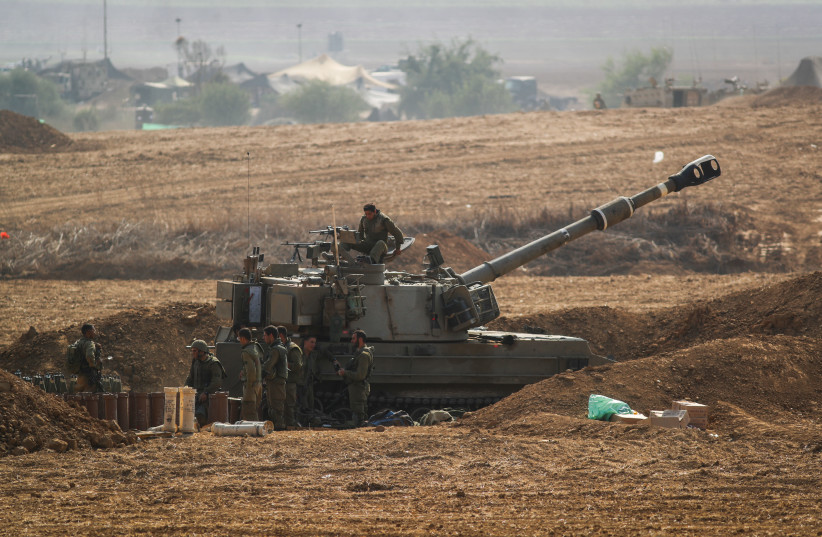Though the fog of war between Israel and Hamas persists, certain truths have emerged in the last few days. Israel’s considerable military power and overwhelming superiority have not guaranteed the highest-level of deterrence against the full spectrum of threats that the country faces on multiple fronts.
Deterrence must be maintained in all facets of national security, and a significant lapse in one theater can have considerable broader repercussions.
The apparent weakness of Hamas has been used to their advantage, and overconfidence in our power has undermined our security. The tactical challenges that Israel faces from time to time, whether in terms of defending against attacks or their disruption, have created a more reactive posture rather than initiating a proactive operational strategy with respect to Gaza. This is particularly relevant now, as we search for an effective and robust response to the savage onslaught of Hamas in the south and the strategic challenges and choices that must now be faced.
In addition, we have overly relied on assessments of the enemy’s intentions rather than on their offensive capabilities. By trying to assess their intentions, we tend to inject our own logic into their thought process, which, among other factors, led to the massive systemic failure to foresee the Yom Kippur War in 1973 and, now, the Black Saturday War of 2023.
It is crucial to pay more attention to the capabilities of any opposing force and how those capabilities can be used to overcome their disadvantages. The conclusion that such capabilities once possessed will inevitably be used may be unavoidable. This is a particularly complex calculation with respect to Hezbollah’s and Iran’s considerable offensive capabilities and will present some profound dilemmas in planning and timing.

Unprecedented incursion into Israeli territory
NEVER BEFORE has Israel experienced such a substantial and protracted incursion into its territory without any provocation, including the cold-blooded massacre of hundreds of men, women, children, and elderly civilians as well as captured soldiers. It appears that well over 100 Israelis, including young children, have been taken prisoner to Gaza. Israeli kibbutzim and villages around Gaza were taken by Hamas, which also overran or destroyed critical military command and control facilities.
The Hamas assault of a massive initial salvo of rockets – combined with terrorists crossing the border on land and by air, using hang gliders, and by sea – neutralized the exaggerated Israeli reliance on the static land barrier created on the border with Gaza. This barrier, with high fences, radar systems and underground sensors, proved to be as ineffective as the Maginot and Bar Lev lines combined. This was a classic example of how a low-tech and relatively unsophisticated attack is able to effectively bypass a state-of-the-art defensive deployment.
The fact that the Israeli intelligence and defense establishments were clearly taken by surprise almost 50 years to the day after the Yom Kippur War will clearly necessitate a major Commission of Inquiry once the hostilities subside. However, this gross security breach cannot be separated from the political situation that has evolved in Israel since the beginning of this year. A cardinal rule was broken by this government: internal unity within Israel is one of the critical factors with respect to the preservation of national security and Israel’s deterrence.
Netanyahu and societal split
THE JUDICIAL upheaval pursued by the Netanyahu coalition created an unprecedented split within Israeli society. One did not have to be a strategic expert to realize that this disunity would be seen by our enemies as a perceived critical weakness in Israel’s capability to defend its vital security interests and therefore become their opportunity to attack.
The heads of the army and defense establishment warned Prime Minister Netanyahu of the security implications of this vulnerability, but he chose to continue the judicial upheaval. Consequently, the impact on Israel’s security has been evident from the events of the last days and has yet to be fully assessed.
The crucial objective at this point is to restore full Israeli control over the border area with Gaza and eliminate all Hamas and Islamic Jihad infiltrators on the ground. Israel must make some tough decisions regarding the need to demonstrate to Hamas that its savage and barbaric attack will not go unanswered; do everything possible to repatriate all the Israeli prisoners taken to Gaza; and monitor closely the northern border and any attempt by Hezbollah and Iran to precipitate an even more intense conflict.
In addition, every effort must be made to preserve stability in the West Bank and Jerusalem and find ways to strengthen the Palestinian Authority. Moderate Palestinians need no reminders of the savagery of Hamas. Stabilizing our relations with the PA would also strengthen the political support Israel is receiving around the world in general and particularly from the United States and Europe.
This solidarity and support will remain critical factors as Israel continues to respond in a determined and resolute way to the savage onslaught by Hamas and to shore up its deterrence with respect to other hostile forces in the region, particularly Hezbollah and Iran.
In this context, President Biden’s exceptional speech in support of Israel this week and his decision to send the Gerald Ford carrier strike group to the Eastern Mediterranean are an important show of force and a clear deterrent signal to Iran and Hezbollah to consider their next steps very carefully. This is not only an additional 100,000 tons of deterrence, but also the most sophisticated and lethal war machine in a class of its own. This degree of support and solidarity shown by the United States should remind us once again of the key strategic significance of the American-Israeli strategic partnership that we would do well to preserve at all costs.
The writer is a former vice-director general of the Israel Foreign Ministry responsible for strategic affairs and has served as ambassador to Germany and deputy ambassador to Washington.
